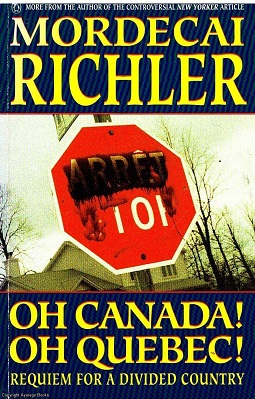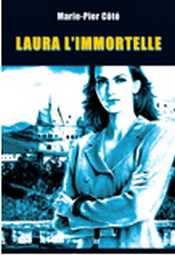
Le Devoir is a French-language newspaper published in Montreal and distributed in Quebec and throughout Canada. It was founded by journalist and politician Henri Bourassa in 1910.

The 1995 Quebec referendum was the second referendum to ask voters in the predominantly French-speaking Canadian province of Quebec whether Quebec should proclaim sovereignty and become an independent country, with the condition precedent of offering a political and economic agreement to Canada.
Articles related to Quebec include:
François Avard is a Canadian writer and scenarist best known as the writer of the Québécois television series Les Bougon.

Oh Canada! Oh Quebec! Requiem for a Divided Country is a book by Canadian novelist Mordecai Richler. Published in 1992, it parodied the evolution of language policy in Quebec, and spoofed the Canadian province of Quebec's language laws that restrict the use of the English language. The book, a best-seller, grew out of a long article published in a September 1991 issue of The New Yorker.

Ralph Zachary Richard is an American singer-songwriter and poet. His music is a combination of Cajun and Zydeco musical styles.
Anti-Quebec sentiment is a form of prejudice which is expressed toward the government, culture, and/or the francophone people of Quebec. This prejudice must be distinguished from legitimate criticism of Quebec society or the Government of Quebec, though the question of what qualifies as legitimate criticism and mere prejudice is itself controversial. Some critics argue that allegations of Quebec bashing are sometimes used to deflect legitimate criticism of Quebec society, government, or public policies.
André Pratte is a Canadian journalist and former senator who represented the De Salaberry division in Quebec. Before being appointed to the Senate by Prime Minister Justin Trudeau on March 18, 2016, Pratte was a journalist for over 35 years and was editor-in-chief of the Montreal newspaper La Presse. He was a member of the Independent Senators Group.
The Jan Wong controversy refers to a claim made by Jan Wong on September 16, 2006, three days after the shooting at Dawson College in Montreal. Canada's nationally distributed newspaper of record, The Globe and Mail, published a front-page article titled, "Get under the desk," by Jan Wong. In the article, Ms. Wong controversially linked all three Quebec school shootings of the last two decades—1989 École Polytechnique Massacre, 1992 Concordia University Massacre, and 2006 Dawson College Shooting —to the purported alienation brought about by "the decades-long linguistic struggle" within the province. Public outcry and political condemnation soon followed in many venues. In response, a Globe and Mail editorial attempted to minimize the controversy as a "small uproar" over journalistic freedom, but this caused further condemnation. Jan Wong maintained her perspective and wrote extensively about the whole experience in her book Out of the Blue, A Memoir of Workplace Depression, Recovery, Redemption and, Yes, Happiness.
Robin Philpot is a Quebec journalist and 2007 electoral candidate for the Parti Québécois.

Les Cèdres is a municipality located north of the Saint Lawrence River in the Montérégie of Quebec, Canada, near Vaudreuil-Dorion. The population as of the Canada 2021 Census was 7,184. The name means "The Cedars" in French.

Normétal is a municipality in northwestern Quebec, Canada, in the Abitibi-Ouest Regional County Municipality. It had a population of 778 in the 2021 Canadian census.

Normand Lester is an investigative journalist from Quebec. Though he built his reputation through investigations of the Canadian Security Intelligence Service (CSIS), the Royal Canadian Mounted Police (RCMP) and the Canadian Forces, he is best known for the controversy created in Canada after the publication of his book Le Livre noir du Canada anglais in 2005.

Laura l'immortelle is a novel by Marie-Pier Côté, a Québécois Canadian author. The book was published by Les Éditions des Intouchables on January 17, 2007, when Côté was 12 years old.
Quebecers or Quebeckers are people associated with Quebec. The term is most often used in reference to descendants of the French settlers in Quebec and people of any ethnicity who live in the province.
The Prix du Cercle du livre de France is a literary prize created by the Quebec publishing house Le Cercle du livre de France with the aim of promoting Quebec authors. From 1977 to 1985, the prize was offered by Esso Canada and was renamed Prix littéraire Esso du Cercle du livre de France.
Corinne De Vailly is a French-born Canadian writer living in Quebec.
The Rose Family is a Canadian documentary film, directed by Félix Rose and released in 2020. The film centres on the filmmaker's status as the son of Paul Rose, a onetime leader of the Front de libération du Québec who was convicted of kidnapping and murder in the death of Pierre Laporte, and his efforts to come to terms with his complicated familial legacy.
The COVID-19 vaccination campaign in Quebec is an ongoing provincial effort to distribute and administer vaccines against COVID-19.










